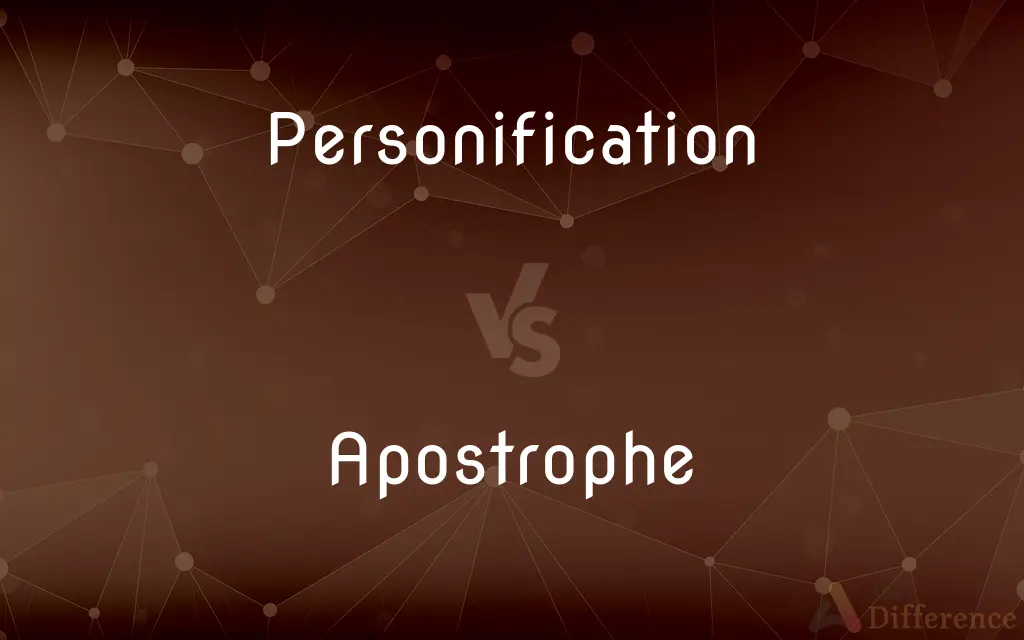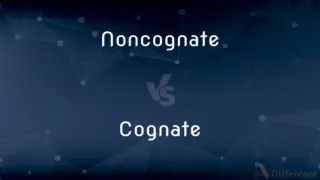Personification vs. Apostrophe — What's the Difference?

Difference Between Personification and Apostrophe
ADVERTISEMENT
Compare with Definitions
Personification
The attribution of a personal nature or human characteristics to something non-human, or the representation of an abstract quality in human form
The book provides a sustained account of how literary personification works
Apostrophe
The apostrophe (' or ’) is a punctuation mark, and sometimes a diacritical mark, in languages that use the Latin alphabet and some other alphabets. In English, it is used for four purposes: The marking of the omission of one or more letters, e.g.
Personification
A figure intended to represent an abstract quality
The knight is accompanied by two feminine personifications of vice
Apostrophe
The superscript sign ( ' ), usually used to indicate the omission of a letter or letters from a word, the possessive case, or the plurals of numbers, letters, and abbreviations.
Personification
The act of personifying.
ADVERTISEMENT
Apostrophe
The direct address of an absent or imaginary person or of a personified abstraction, especially as a digression in the course of a speech or composition.
Personification
A person or thing typifying a certain quality or idea; an embodiment or exemplification
"He's invisible, a walking personification of the Negative" (Ralph Ellison).
Apostrophe
(orthography) The text character ’, which serves as a punctuation mark in various languages and as a diacritical mark in certain rare contexts.
Personification
A figure of speech in which inanimate objects or abstractions are endowed with human qualities or are represented as possessing human form, as in Hunger sat shivering on the road or Flowers danced about the lawn. Also called prosopopeia.
Apostrophe
(rhetoric) A sudden exclamatory piece of dialogue addressed to someone or something, especially absent.
Personification
Artistic representation of an abstract quality or idea as a person.
Apostrophe
A figure of speech by which the orator or writer suddenly breaks off from the previous method of his discourse, and addresses, in the second person, some person or thing, absent or present; as, Milton's apostrophe to Light at the beginning of the third book of "Paradise Lost."
Personification
A person, thing or name typifying a certain quality or idea; an embodiment or exemplification.
Adolf Hitler was the personification of anti-Semitism.
Apostrophe
The contraction of a word by the omission of a letter or letters, which omission is marked by the character ['] placed where the letter or letters would have been; as, call'd for called.
Personification
A literary device in which an inanimate object or an idea is given human qualities.
The writer used personification to convey her ideas.
Apostrophe
The mark ['] used to denote that a word is contracted (as in ne'er for never, can't for can not), and as a sign of the possessive, singular and plural; as, a boy's hat, boys' hats. In the latter use it originally marked the omission of the letter e.
Personification
An artistic representation of an abstract quality as a human
The Grim Reaper is a personification of death.
Apostrophe
Address to an absent or imaginary person
Personification
The act of personifying; impersonation; embodiment.
Apostrophe
The mark (') used to indicate the omission of one or more letters from a printed word
Personification
A figure of speech in which an inanimate object or abstract idea is represented as animated, or endowed with personality; prosopop ia; as, the floods clap their hands.
Personification
A person who represents an abstract quality;
She is the personification of optimism
Personification
Representing an abstract quality or idea as a person or creature
Personification
The act of attributing human characteristics to abstract ideas etc.
Share Your Discovery

Previous Comparison
Noncognate vs. Cognate
Next Comparison
Easy vs. Easier














































